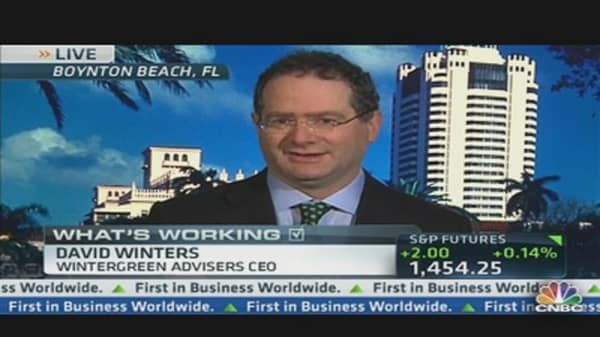—And even if not, is that the worst thing for the euro zone? A weaker German economy, after all, could give the European Central Bank (which meets Thursday) more room to ease policy to shore up the much weaker peripheral economies. Europe STOXX 600 up about 0.3 percent prior to the close.
(Read more:
Is This the Year That the Euro Crisis Ends?
)
An ECB surprise?
—It's "striking" how much the euro has recently diverged from its second-half 2012 drivers, Citigroup said. The previously tight relationship between euro zone bank stocks and sovereign spreads has broken down since late December. In particular, the euro's recent weakness has held despite improvement to the sovereign risk profile, the run-up in short-term German bond yields and the global risk rally — all of which until the last several weeks were important drivers.
—So, it's "possible that investors are looking for, or at least taking precautions against, an ECB surprise move on Thursday aimed at easing funding pressures," Citi notes. "If they do nothing, as our economists expect, there may be a bit of a EUR reflex bounce."
Funding-for-Lending: Working?
—The Bank of England also meets Thursday, with no adjustments to current policy (0.5 percent target rate, 375 billion of Gilt purchases in 2013) expected. The economic news out of Britain since last month's meeting has been "broadly neutral," noted Goldman; of more interest is growing "evidence that the BoE's Funding for Lending scheme is gaining traction." To wit, record jumps in the availability of credit to households and corporates in the fourth quarter, a sharp drop in wholesale funding costs for U.K. banks, and a steady rise in mortgage approvals from a low of 44,500 five months ago to 54,000 in November.
—Other options the BoE could pursue if it deems more stimulus necessary this year: reducing haircuts on collateral, lowering the remuneration (or, interest) rate on reserves banks hold at the BoE, talking rates down through policy guidance, or directly purchasing bank debt. It's hardly alone in exploring unconventional options, which is why so much of the developed world's attention is currently paid to which schemes actually appear to be working.
(Read More: Will ECB Be More Aggessive in 2013?)
Japan's Double-Barrelled Stimulus Shotgun
—Speaking of which, Japan. The first of the G4 central banks to grapple with the deflation monster is still struggling to conquer it. The country's new (old) prime minister Shinzo Abe has reconvened a lapsed committee — the Council on Economic and Fiscal Policy — as a method of "coordinating" fiscal and monetary policy; Bank of Japan Governor Shirakawa joined its meeting today, saying little publicly after its conclusion. More telling will be whether the BoJ formally adopts a doubling of its inflation target to 2 percent at its next policy meeting Jan. 21-22.
—Given the Nikkei's 22 percent jump since mid-November, markets are clearly betting on a more aggressive central bank. Meanwhile, Nomura expects fiscal stimulus of up to 20 trillion yen (10 billion of which would be new) to be approved by the Cabinet mid-month, by the Diet next month, and to boost growth starting in the second quarter; the firm nearly doubled its GDP forecast for Japan to 1.8 percent from 1 percent for full-year 2013. Betting on stimulus, fine. Betting on its success? Pinpoints is wary.
Theme du jour:
—It's a buyback-driven world when it comes to the U.S. stock market, says Brian Reynolds of Rosenblatt Securities. As during the last credit boom cycle, most major investor groups are selling equities, but corporate share buybacks are so strong as to more than offset that and power stocks higher.
—"In both bull markets, the major participants were net sellers through 15 quarters. In both cases, it was the credit-driven buybacks that were responsible for stock price gains." The current market has been stronger, but also suffered more frequent and violent corrections because "while buybacks have been stronger, so has the selling from other investors," namely households, hedge funds, private pensions and government pensions, per Mr. Reynolds. Corporate buybacks have totaled nearly $1 trillion since 2008, while other investors have sold roughly $200 billion worth of equities during the same period.
—Given this and other factors (like underfunded pensions) likely to keep the credit boom going for now, we can still expect "more years of 7 to 13 percent gains" in the stock market, he reckons.
It's all a bit eerily reminiscent of Mr. Prince's famous 2007 quote: "As long as the music's playing, you've got to get up and dance."
—By CNBC's Kelly Evans; Follow her on Twitter: @Kelly_Evans




